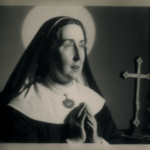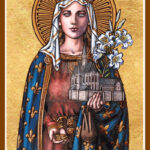
St. Kateri Tekakwitha
St. Kateri Tekakwitha
When She Lived:
Kateri Tekakwitha, also known as Lily of the Mohawks, lived during the 17th century. She was born in 1656 in the Mohawk village of Ossernenon (present-day Auriesville, New York).
Where She Lived:
Kateri lived in the Mohawk territory, which was part of the northeastern woodlands of North America. This region encompassed parts of present-day New York, Vermont, and Quebec, Canada.
Notable World Events During Her Life:
- The Great Plague of London (1665-1666): A deadly outbreak of bubonic plague that swept through London, causing the death of an estimated 100,000 people, roughly a quarter of the city’s population.
- The Great Fire of London (1666): A catastrophic fire that raged through central London, destroying a significant portion of the city’s buildings, including 87 churches and numerous homes.
- Newton’s Theory of Universal Gravitation (1687): Sir Isaac Newton published his groundbreaking work “Philosophiæ Naturalis Principia Mathematica,” in which he formulated the laws of motion and the law of universal gravitation.
- The Glorious Revolution (1688-1689): A bloodless revolution in England that led to the deposition of King James II and the ascension of William III and Mary II to the English throne, affirming parliamentary supremacy.
- Founding of the Bank of England (1694): The Bank of England, the central bank of the United Kingdom, was established to act as the government’s banker and issuer of banknotes.
Her Patronage:
Kateri Tekakwitha is recognized as the patron saint of ecology and the environment. Her deep connection with nature and the environment, often seeking solace and spirituality in the wilderness, has made her a beloved figure among those advocating for the protection of nature.
Early Life
St. Kateri Tekakwitha was born around the year 1656 in today’s New York state. Her father was a Mohawk warrior, while her mother was a Christian from the Algonquin tribe. Her mother gave Kateri a sense of the living God.
When Kateri was a child, her tribe was attacked by a smallpox epidemic. Both her father and mother were among those who had died. She, too, got the disease, leaving her with permanent scars on her face and impaired eyesight. The chief of their tribe, Kateri’s uncle, adopted her. While she was still very young, Kateri’s aunts began planning her marriage.
Kateri’s Conversion
When Kateri was eighteen years old, Jacques de Lamberville, a Catholic missionary, came to their village, bringing the message that God loves all people. However, most members of the Mohawk tribe did not believe the missionary’s message. On the other hand, Kateri believed this and began receiving instruction in the Catholic faith. Eventually, Kateri was baptized by de Lamberville. She also realized that she was called into an intimate union with God as a consecrated virgin.
A Holy Life

Because of Kateri’s new belief, many members of their tribe made fun of her. She was also ostracized by her tribe for refusing the marriage that had been planned for her. The life of the Mohawk village had become violent, and debauchery was commonplace. Realizing that this was proving too dangerous to her life and her call to perpetual virginity, she ran away and took refuge in the St. Francis Xavier Mission in Caughnawaga, Quebec, near Montreal. She worked there and was still faithful to her people’s traditions. However, she renounced their religious beliefs. Kateri lived a simple life and was faithful to her love for Jesus, to prayer, and to attending the daily Mass.
Kateri led a holy life by example. She dedicated much of her time to teaching children and caring for the sick and elderly. Her greatest and sincerest desire was to know and do what pleased God. Kateri lived out the last years of her short life here, practicing austere penance and constant prayer.
Kateri died in 1680, when she was just twenty-four years old. Devotion to Kateri began immediately after her death, and her body, enshrined in Caughnawaga, is visited by many pilgrims each year. Fifty years after her death, the first convent for Indian nuns was founded in Mexico. She was beatified by Pope John Paul II in 1980 and canonized by Pope Benedict XVI on October 21, 2012. Her feast day is July 24.
Five Interesting Facts About St. Kateri Tekakwitha
- At her death, it is said that the disfiguring scars St. Kateri Tekakwitha suffered from smallpox disappeared and her face shone with radiant beauty.
- St. Kateri Tekakwitha was said to have reached the highest levels of mystical union with God, and many miracles were attributed to her while she was still alive.
- St. Kateri Tekakwitha is often called “The Lily of the Mohawks” or “the Mohawk Maiden.”
- St. Kateri Tekakwitha is the first canonized indigenous woman of North America and the second indigenous person of North America to be canonized, the first being St. Juan Diego Cuauhtlatoatzin, whose tilma was used by the Virgin Mary to imprint her image, now known worldwide as Our Lady of Guadalupe.
- The meaning of the name Tekakwitha has been rendered into English as “she walks groping for her way.” Another rendering is “she puts things in their place.”
Prayer to St. Kateri Tekakwitha
God our Father, whom Kateri Tekakwitha liked to call the Great Spirit, We thank you for having given us this young woman as a model of the Christian life. Despite her frailness and her community’s resistance,she bore witness to the presence of Christ. With her companions, she drew close to the elderly and the sick. Every day, she saw in nature a reflection of her own glory and beauty. Grant that by her intercession we may always be close to you,more sensitive to the needs of those around us,and more respectful of creation. With her, we shall strive to discover what pleases you and endeavor to accomplish it until the day you call us back to you. Amen.



